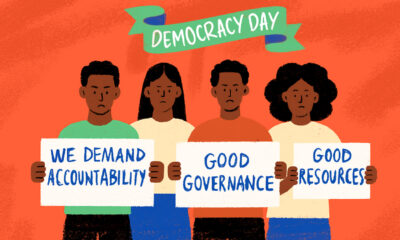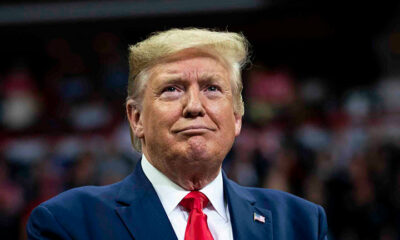Features
Ada Njemanze: Why Are Our Leaders So Hard to Reach?

The ability to interact and connect effectively with people is an essential factor for every government. This is one of the reasons why people like Barack Obama, Nana Akufo-Addo of Ghana, and the unorthodox Donald Trump may be considered good leaders.
As young people took to the streets to express their anguish and dissatisfaction at the Nigerian Police Force, the protectors of the populace, one can assume the country is going through an awakening moment. The main target of the anger is the Special Anti-Robbery Squad (SARS), a rogue force unit formed in 1992 to curb robbery in the country, but has now resorted to extorting, kidnapping, extra-judicial killings, and much more.
As the protests reach its 7th day, celebrities, international media, and organizations around the world have taken up the famous hashtags, which further shed more light and visibility as to why young people are demonstrating and exercising their human rights that are being abused. However, within the country, it has not been viewed as urgent by the leadership, with official statements from the presidency coming three/four days late. This has left the people with concerns about how inefficient the communication of the leadership is and its utter disregard for its people. This may not be the first time the presidency is slow to react to rising circumstances within the nation, but after the abduction of the Chibok girls, this is one story that has caught the world’s attention.
The presidency of every country consists of a professional cabinet that is meant to be prepared and ready for any crisis, and briefing the president as soon as possible. But here, on the third day of the demonstrations, protesters were still calling for the presidency to address the people. This demonstrates a high degree of disconnect between the leaders and the people, which is really amazing because during election and campaign seasons, these politicians are always available to interact and reach the public. Does that explain where the priorities lie?
Government responses did not begin to pour in until after Day 5 and violence in some areas of the nation had erupted – which further affirmed why the protests began in the first place. One begins to wonder if communication and media advisors have no regard for “holding statements,” especially during a crisis. Or is it an utter disregard for the “lazy Nigerian youth”, or the mind-set of “they will get tired after three days.” What exactly warrants this degree of silence when communication is needed best? This is where media advisers are expected to use their office power to pacify the situation while assessing the right strategies of resolution behind closed doors.
The word vague describes the memo conveyed to Nigerians when the people eventually heard from the Presidency. The memo still reinforces the negligence and lack of empathy with which people are treated. What is needed is a straight cut and comprehensive roadmap on the ways to address the problem at hand, the steps already under way to achieve them, and commitment to the people that the government will do everything to protect the citizens. It’s simple communication 101, but why can’t the people get that from elected officials? Why is the chain of communication so badly distorted that one would need a magnifying glass every time to assess the facts and dealings of the leaders? People stood to vote for their leaders under the scorching sun and heavy rain, yet transparency after election victory becomes an issue.
A big takeaway message from the #EndSars protests is the poor coordination within the leadership itself. The governors, the presidency, and the police force seem to share contradictory messages to the people at the same time. There’s also the obvious lack of control over its workers in some government agencies. This was very apparent in the significant roles that legislators, governors and lawyers had to play in securing the release of detained demonstrators despite superior orders.
So what is the way forward?
Definitely not by setting up another ‘ghost’ committee. You have to develop an efficient form of communication to illustrate openness, accountability, conflict resolution and feedback. The vice president or official media adviser should be on the front lines in a situation where the president is indisposed. Everyone saw Ghanaians complain about the weekly press address of President Nana Akufo-Addo, especially when the coronavirus became prevalent in most African countries. The world watches the Secretary of the White House Press address members of the press and the public when appropriate. Why can’t Nigeria imitate that?
Every time a crisis occurs, citizens should never have to demand for their president to address them, press statements should not be resolved for special occasions, and city hall meetings should not be held only during elections.
Finally, young people shouldn’t have to live in fear of their lives in their own country while comfortably calling another country “home.”






















